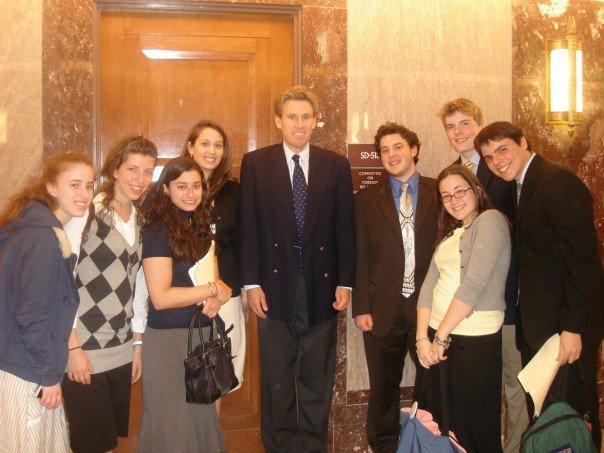As a high school senior, I helped organize a lobbying trip for my class to meet with Congressman and their staff in Washington, D.C. to discuss pressing foreign policy issues. We met with dozens of political leaders on the Hill to voice our perspective on several international issues, most notably Iran's nuclear program. I felt that it was vital to express our political opinions to those most closely involved in Congressional foreign policy debates. Consequently, I reached out to numerous staff members on the Senate Foreign Relations Committee and the House Foreign Affairs Committee. One of the staff members on the Senate Foreign Relations Committee agreed to meet us.
We had an excellent hour-long exchange with this staff member, focusing on U.S. policies to prevent Iran from acquiring a nuclear weapon. He was incredibly engaging and treated our viewpoints with a great deal of respect even though we were many years his junior. He sent me a kind follow-up note remarking "It was my pleasure [meeting your group]. You guys were great." That meeting was the highlight of my class' lobbying trip, leaving us with the impression that senior foreign policy leaders in Washington, D.C. were listening to us.
I recently discovered that the aforementioned staff member was the late Ambassador Chris Stevens, who was tragically killed in an attack on the U.S. Consulate in Benghazi, Libya on September 11, 2012. Ambassador Stevens was a Foreign Service officer participating in a Pearson Fellowship on the Senate Foreign Relations Committee when he met us in 2007.
The Libyan people highly admired Ambassador Stevens. The Washington Post reported that "Stevens promoted U.S.-Libyan relations by making himself accessible to ordinary Libyans," conversing with people on the street and having coffee with them. Libyans risked their own lives by rushing into the burning Consulate to try to save Ambassador Stevens. Additionally, hundreds of Libyans marched in protest against the attack on the Consulate a few days later, showcasing their support and grief for Ambassador Stevens and the three other Americans who were killed. Ambassador Stevens was appreciated because of his respect and empathy for others, whether it was Libyans trying to secure their democratic future or American high school students passionate about politics.
Ambassador Stevens' service to the American government and people demonstrates the importance of interpersonal relations and cultural exchange as key elements of U.S. foreign policy. U.S. foreign policy capabilities in the Middle East were greatly strengthened by Ambassador Stevens' efforts to treat others as his equal and to work with people from different countries to build a more just and free world. It is clear that the U.S. is much more successful in accomplishing its foreign policy objectives when it treats diplomacy with the same value that Ambassador Stevens did. As Secretary Hilary Clinton noted, "The world needs more Chris Stevenses."
